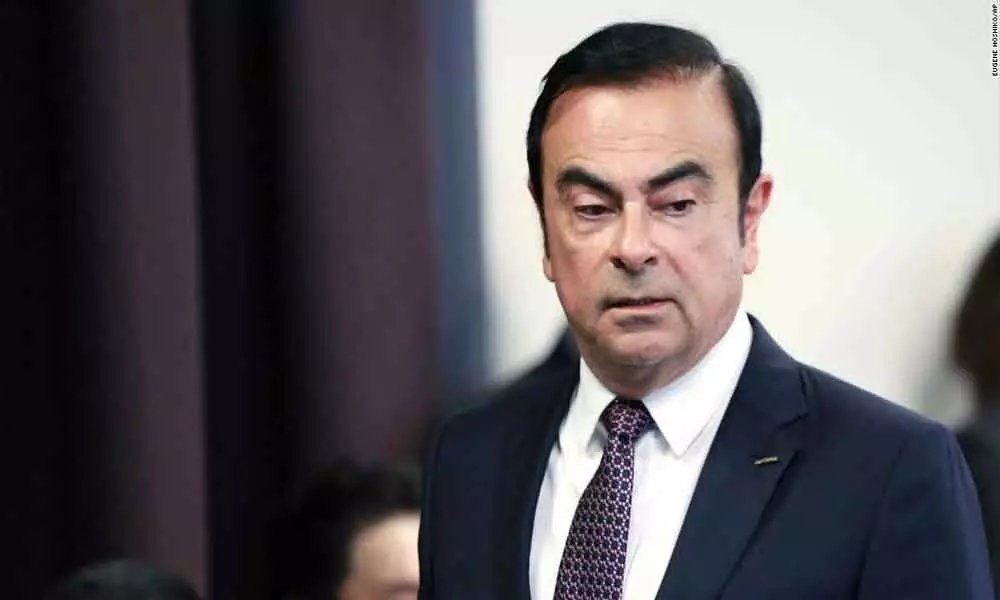Live
- Celta Vigo extend all-time club top-scorer Iago Aspas’ contract till 2026
- BGT: Kaif gives preference to Jaiswal-Rahul opening pair for Boxing Day Test against Australia
- Odisha CM Majhi, Naveen Patnaik extend Christmas greetings
- Icebreaker Keyboard: AluminIum Design Costing as Much as a MacBook Pro
- ‘Rifle Club’ Movie Review: A Stylish Thriller That Falls Short in Storytelling
- Chennai to Experience Heavy Rain as Severe Low-Pressure System Approaches Coastal Areas
- Pradeep’s ‘Akkada Ammayi Ikkada Abbayi’ hypes up with energetic new song
- Dil Raju releases ‘Adi Dha Saaru’ song from ‘Sahakutumbanam’
- GTA 5 Online Car Duplication Glitch: How to Duplicate Cars for Money (2024)
- 'Srikakulam Sherlock Holmes' Review: A quirky thriller thay doesn’t impress
Just In
Carlos Ghosn: How Did He Flee Japan Without Any of His Three Passports?


Carlos Ghosn was very famous in Japan as a titan of the automotive industry, the charismatic head of the iconic automakers Nissan and Mitsubishi Motors.
Carlos Ghosn was very famous in Japan as a titan of the automotive industry, the charismatic head of the iconic automakers Nissan and Mitsubishi Motors. If he was not one of the most recognisable faces in the country, then, he indeed became one when he was spectacularly fired after being arrested in November 2018 on suspicion of financial misconduct.
The terms of his bail of 1.5 billion yen ($ 13.8 million) obligatory for him to live in Japan before his trial, established for 2020. Considered a risk of escape, Ghosn's three passports were seized, maintained by his defence team for that could not leave the country. He was under strict observation and was subject to restrictions on the use of phones and computers.
If he could not leave his apartment in Tokyo to buy a carton of milk without anyone knowing, how could he escape the country?
There has been plenty of speculation. One of the most extravagant theories that emerged in the Lebanese media was that he was smuggled into a box designed for musical instruments, after a private performance at his home by a group of Gregorian music.
Were the circumstances of his escape more simple, and did he give Japan the pass with the help of a bogus passport, as the French news newspaper Les Echos reported? (One of the three passports held by Ghosn was French).
Whatever but Ghosn himself gave no further details in a statement that attacked the "manipulated Japanese justice system," such an escape would have needed elaborate planning and not negligible resources. Junichiro Hironaka, the lawyer representing Ghosn, said he must have had the help of a "large organisation" to escape.
He somehow or other, evaded surveillance in Tokyo. Ghosn has a way of disguising himself: when he left prison after being released on bail, he left the court dressed as a maintenance worker, in an apparent effort to evade the assembled media. He did not succeed.
Then we wonder how he left Japan. The Wall Street Journal said that Ghosn arrived in Lebanon through Turkey, a version of the events verified by the French media Les Echos, among others. This was backed by data from the Flightradar24 flight tracker, which shows a private plane flying from Osaka, Japan, to Istanbul, Turkey, and then another that continued to Lebanon at the time it is said that Ghosn arrived in the country.
Whatever the form of his departure from Japan, his arrival in Lebanon, where he grew up after his family moved from Brazil, seemed much more conventional.
Ghosn arrived in Beirut at dawn on Monday, seemingly landing from Turkey without even raising a Lebanese eyebrow. "Carlos Ghosn entered Lebanon at dawn yesterday legally," Lebanon's ministry of foreign affairs said in a statement reported by the country's national news agency. "The circumstances surrounding his departure from Japan and entry into Beirut are unknown, and all chatter about it is a private matter [pertaining to Ghosn]."
Shock and rage in Japan
In the meantime, there was consternation in Japan. Hironaka told reporters Tuesday that his client's flight from Japan was a "complete shock."
"We are puzzled and shocked," he said, explaining that Ghosn didn't have his passports and "could not possibly use them."
Masahisa Sato, a lawmaker with Shinzo Abe's ruling Liberal Democrat Party (LDP), said Ghosn had plainly jumped bail. "If this is true, it was not 'departing the country,' it was an illegal departure and an escape, and this itself is a crime," he said, as per AFP.
"Was there help extended by an unnamed country? It is also a serious problem that Japan's system allowed an illegal departure so easily," said Sato, a former minister of state for foreign affairs.
There was fury in France, too, where Ghosn had engineered a complex and sometimes uneasy alliance between Nissan, Mitsubishi and the French automaker Renault. The French government was "shocked" that Ghosn had left Japan, economy secretary Agnès Pannier-Runacher told France Inter radio. Ghosn is "not above the law," she said, adding that "if a foreign citizen fled French justice, we would be really angry."
Ghosn said in a statement he looked forward to communicating "freely" with journalists starting next week. He may elaborate on how pulled off the escape of the decade.
Source: CNN Business

© 2024 Hyderabad Media House Limited/The Hans India. All rights reserved. Powered by hocalwire.com






